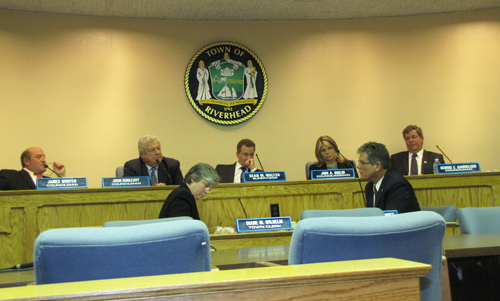State audit finds town’s use of ‘chargebacks’ improper

Riverhead Town’s “structural deficit” of $3.2 million could grow by another $1 million to $3 million as a result of the recommendations of a recent New York State comptroller’s audit of the town’s administrative chargebacks, according to Supervisor Sean Walter.
That’s because the audit from state Comptroller Thomas DeNapoli’s office is telling the town the method by which it obtained nearly $3 million in administrative payments to the the town general fund from other town departments is not “adequate” and needs to be revised.
The town has submitted a corrective action plan that would bring in about $1 million less in administrative chargebacks to the general fund, Mr. Walter said.
But even if the comptroller approves that plan, which it has yet to respond to, “the town general fund is another $1 million short,” Mr. Walter said, because it anticipated receipt of those funds. If the comptroller doesn’t approve that plan, the town budget will be another $2.98 million short, since it cannot continue to use the current plan, which anticipates that much in administrative chargebacks to the general fund, he said.
The town for many years has charged other town taxing districts like the highway district, water district, sewer, garbage and others an “administrative chargeback” of 14.2 percent of their budget from the previous completed year, which would actually be two years ago, since the budget is devised in November.
The chargebacks, which total $2.98 million in the 2012 budget, are meant to account for those departments’ use of general fund services, such as the tax receiver’s office, which collects taxes for every department, or the town attorney’s office, which might advise or defend other departments, or things like payroll services.
The method of just doing a flat percentage across the board was instituted because it would be too difficult to actually determine the cost of what each department uses in general fund services, town officials have said.
As for the structural deficit, Mr. Walter said, that refers to the fact the town used $3.2 million in surplus funds to balance its 2013 budget, and the loss of the administrative chargeback funding to the general fund will make that deficit even higher. There is only about $6 million left in surplus funds, though more money is coming in from Sandy-damaged cars being stored on town land in Calverton.
“We’re $3 million behind now, we’ll be $4 million behind if the comptroller agrees with this [corrective action], and if they don’t agree, we’re more than $6 million behind,” Mr. Walter said.
But the use of chargebacks in the town has also been controversial, as town highway Superintendent George Woodson, Business Improvement District president Ray Pickersgill and others have complained that they are being made to pay for services they don’t receive.
Mr. Walter said he had been getting conflicting advice on the issue, including advice from people at the state comptroller’s office, and so he asked the comptroller’s office last year to do a formal audit of the administrative chargebacks.
“There was so much controversy over it between the highway superintendent and various department heads,” Mr. Walter said. “I really pressed the comptroller, because the town needs an answer to this.”
That audit was made public this week, and the results weren’t pretty.
“This is not an adequate method of allocation because it assumes that the entire budgets of the town’s cost centers [taxing districts] were devoted to services provided to the other receiving funds,” the audit states.
“In addition, it assumes that each of the receiving funds received equal shares of the services from each cost center.”
The audit states that “the methods that town officials used for calculating administrative cost allocations were not based on the actual services being provided. Instead, town officials calculated this allocation as a flat percentage of the total budget based on actual expenditures in the administrative cost cost centers for the last complete year.”
The comptroller said the town couldn’t charge back administrative costs to the highway department, which has the same tax base, and couldn’t charge back services such as the Town Board. It also said the chargebacks have to be based on actual expenses, and not on a flat percentage.








